Become A
Radiographer
Graduate in as little as 18 months!
- Financial aid is available.
- Work for small and group practices, hospitals, and surgi-centers.
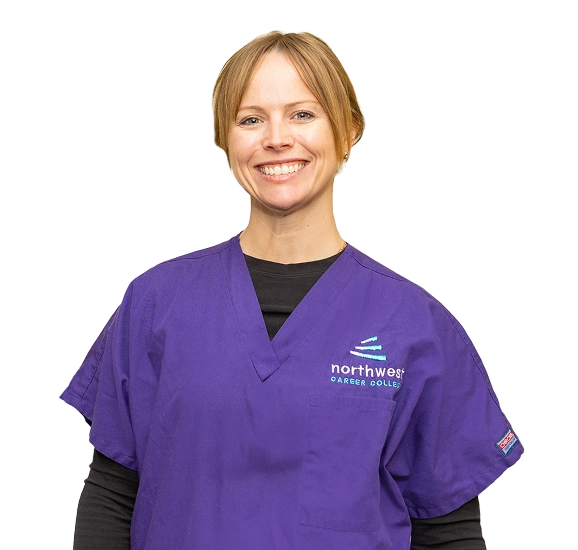
Scholarship Available Now
Hands-On Training
Online And On-Campus Classes
Committed Career Service Team
Laptop For Every Student
Radiography Program In Las Vegas
Want to make a real difference in people’s lives? Take the first step towards a rewarding new career with Northwest Career College’s Radiography Program. Our Las Vegas campus offers a comprehensive Radiography curriculum that equips you with the skills, knowledge, and experience necessary to become a successful Radiographer.
In our 18-month program, you’ll participate in online lecture sessions and on-campus lab sessions before heading out into the field to gain hands-on experience working with patients in a variety of clinical settings. Our instructors are certified, experienced professionals who will help you develop the professional and technical skills needed to excel in the field. After successful completion of our program, you’ll be eligible to sit for the ARRT certification examination in Radiography.
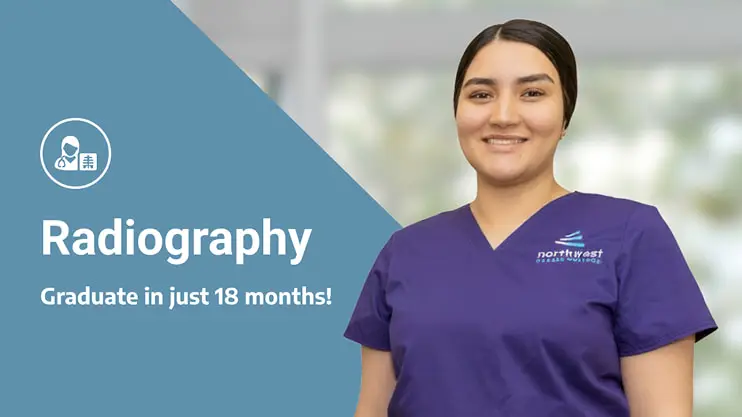
March 2nd, 2026
Rated 4.7 Stars on Google
" I can't wait to start classes"
"I'm very excited that Northwest Career College started offering the radiography program I'm really fascinated about how the body works and I really want a job."
Autumn Estes
Radiography Student
Why The Radiography Program At
Northwest Career College?
Graduate in as little as 18 months
With NCC's Radiography Program, you can complete the program in 18 months or less, depending on the individual student's progress. We offer a rigorous yet flexible learning experience that provides students with the skills and knowledge to become successful radiographers in today’s healthcare environment.
Financial aid is available to those who qualify
Northwest offers a range of financial aid options, including scholarships, grants, and loans. Our Financial Aid team has extensive experience helping students secure the funds they need to make their educational dreams a reality, so contact us today and let them help you get started.
Hands-on instruction in all facets of Radiography
All of our radiography students are offered an externship, giving them real-world experience and a chance to apply classroom knowledge. In addition, our faculty is dedicated to providing hands-on instruction in all facets of radiography, from the basics of imaging technology, radiation safety, and protection, patient care techniques, anatomy, and physiology to digital imaging.
Students are our priority
Northwest’s student-centered philosophy means that our faculty strive to make sure that each of our Radiography students is learning and growing in the best possible way. To this end, we provide a variety of services like tutoring and academic advising, along with career counseling and job-placement assistance.
Flexible Radiography Program class schedules that fit your life
Here at NCC, we know that many of our Radiography students have lives and obligations outside of school. That’s why we offer flexible class schedules to fit your lifestyle.
Work on your own laptop for exceptional training
Each of our Radiography students is provided with a laptop for use in the classroom and beyond to allow them to take their learning with them wherever they go. We ensure our students have access to all the resources they need for success.
Committed career services team on campus
We have a dedicated Career Services team that will help you take the next steps in your career. They provide job search resources, resume and interviewing tips, and support with networking to ensure you have the best possible chance of finding success in your chosen field.
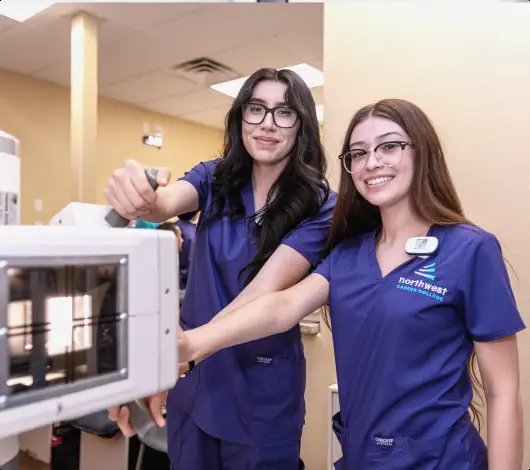
Radiography Program Mission and Goals
Goal 1: Students will demonstrate clinical competence as an entry-level radiographer.
Learning Objective 1.1 - Students will obtain radiographic images of acceptable diagnostic quality.
Learning Objective 1.2 - Students will demonstrate and apply proper safety procedures when obtaining radiographic images.
Goal 2: Students will demonstrate the ability to communicate effectively.
Learning Objective 2.1 - Students will deliver appropriate and effective patient instructions prior to making an X-ray exposure.
Learning Objective 2.2 - Students will communicate appropriately in a clinical setting.
Goal 3: Students will demonstrate critical thinking and problem-solving skills.
Learning Objective 3.1 - Students will demonstrate the ability to modify a patient’s care based on their condition.
Learning Objective 3.2 - Students will complete a basic analysis of the diagnostic quality of a radiographic image.

Radiography
Program Accreditation
The Radiography program is accredited by the
Joint Review Committee on Education in Radiologic Technology
20 North Wacker Drive, Suite 2850
Chicago, IL 60606-3182
312-704-5300
Email: mail@jrcert.org
The program's current accreditation award is 3 years. General program accreditation information and the current accreditation award letter can be found here.
Program Effectiveness Data
This document contains the most current program effectiveness data. Our programmatic accreditation agency, the Joint Review Committee on Education in Radiologic Technology (JRCERT), defines and publishes this information. Click here to go directly to the JRCERT webpage.
- Credentialing Examination:
The number of students who pass, on the first attempt, the American Registry of Radiologic Technologists (ARRT) certification examination, or an unrestricted state licensing examination, compared with the number of graduates who take the examination within six months of graduation. The five-year average benchmark established by the JRCERT is 75%.
- Job Placement:
The number of graduates employed in the radiologic sciences compared to the number of graduates actively seeking employment in the radiologic sciences within twelve months of graduating. The five-year average benchmark established by the JRCERT is 75%.
"Not actively seeking employment" is defined as:
1) Graduate fails to communicate with program officials regarding employment status after multiple attempts; OR
2) Graduate is unwilling to seek employment that requires relocation; OR
3) Graduate is unwilling to accept employment due to salary or hours; OR
4) Graduate is on active military duty; OR
5) Graduate is continuing education.
- Program Completion:
The number of students who complete the program within the stated program length. The annual benchmark established by the program is 85%.
Program
Externship Disclosures
Students may have to conform to additional requirements to participate in externship, such as:
- Complete a background check.*
- Complete a drug screening.*
- Complete evening/weekend assignments.
NCC maintains liability insurance that offers coverage for any injuries a student may cause to an employee or patient of a clinical site while on externship. Coverage does not cover self-inflicted injuries sustained by the student.
*The cost of any background checks or drug screenings required by clinical sites are included in tuition.
Information on the Radiography Program and Externship and Clinical Sites can be found on Radiography Student Handbook.
Radiography Career Outlook
High Demand Career
Employment for all areas of Radiography graduates is expected to grow 6 percent from 2021 to 2031.
2023 Median Pay : $76,020/year
Number of Jobs, 2023 : 271,200
Job Outlook, 2023-33 : 6% (Faster than average)
Employment Change, 2023-33 : 16,800
Detailed definitions of these rates can be found at www.jrcert.org.

Putting Superior Training First
The Associate of Applied Science in Radiography is a program of study designed to qualify its graduates to pursue a career in physicians offices, outpatient care centers, nursing facilities, home healthcare companies and hospitals. Additionally, your Radiography degree opens the doors to working in pharmaceutical and medicine manufacturing, with insurance carriers, medical and diagnostic laboratories and more. Your Radiography Las Vegas coursework prepares graduates to think critically and act ethically within the local and national norms of professional conduct. In addition to the academic and hands-on training, Radiography students will experience an in-depth externship with one of our many employee partners. There's never a dull moment in the Radiography program.
Some Of What You Learn
- Radiographic Physics
- Medical Terminology
- Anatomy and Physiology
- Medical Law & Ethics
- Positioning
- Methods of Patient Care
- Advanced Imaging
- Image Quality and Analysis
- Registry Review
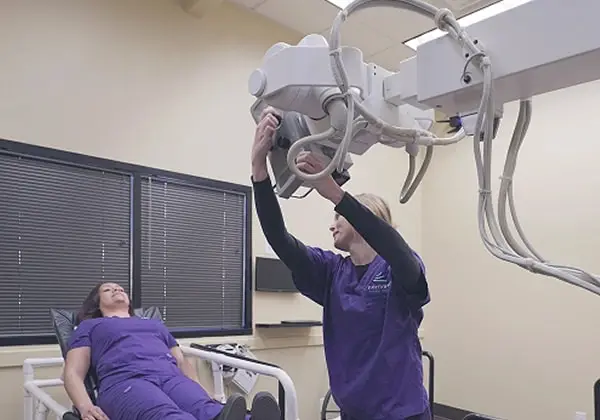
Radiography Program Admissions Process
Admission in the Northwest Career College Radiography Program is competitive based on the number of seats available from the total capacity. Up to 20 students may be selected at the start of the designated term in which 20 seats are available. In order to be admitted into the program applicants must have a GED (or equivalent) or a high school diploma (or equivalent). They must also pass an entrance exam, a math exam, submit an Admissions essay, and complete an in-person interview with the Program Chair of the Radiography Department.
Once the application is filed and the applicant takes the entrance exam, submits the essays, and completes an in-person interview with the Program Chair of the Radiography Department a score is calculated. The process for calculating a prospective Radiography student’s candidate score is based on various assessment components. The candidate score is determined by adding the Admissions Interview Score, the Highest Wonderlic Score, the Math Assessment Score, the Essay Score, the PC Interview Score and alumni status
Candidate Scoring: The candidate score is based on six components:
Highest Wonderlic Score (30%):
- Minimum passing score: 26 out of 50.
- Candidates can retake the test; the highest score is used.
Admissions Interview Score (15%):
- The interview assesses the candidate's communication skills, professionalism, understanding of the program, and readiness for a career in radiography.
- Maximum score: 10
- Evaluated using the Admissions Interview Rubric:
- Communication Skills (0-3 points): Clarity, coherence, and effectiveness of verbal communication.
- Professionalism (0-3 points): Appearance, demeanor, and punctuality.
- Understanding of Program (0-2 points): Knowledge of the radiography field and the program specifics.
- Readiness for Career (0-2 points): Motivation, commitment, and realistic career goals.
Math Assessment Score (10%):
- Consists of 15 questions, with a maximum score of 37.
- Evaluated using the Math Assessment Rubric:
- Basic Arithmetic (0-10 points): Accuracy in basic calculations.
- Algebra (0-10 points): Understanding of algebraic concepts and problem-solving.
- Data Interpretation (0-10 points): Ability to interpret and analyze data.
- Overall Performance (0-7 points): General mathematical aptitude and reasoning.
Essay Score (15%):
- Assesses writing skills, critical thinking, and ability to articulate ideas.
- Maximum score: 15.
- Evaluated using the Essay Assessment Rubric:
- Writing Skills (0-5 points): Grammar, punctuation, and overall writing quality.
- Critical Thinking (0-5 points): Ability to analyze and synthesize information.
- Articulation of Ideas (0-5 points): Clarity and coherence of presented ideas.
Program Chair Score (15%):
- Determined during an interview with the Program Chair.
- Maximum score: 21.
- Evaluated using the Program Chair Score Rubric:
- Knowledge of Radiography (0-7 points): Understanding of the radiography field.
- Career Goals (0-7 points): Alignment of career aspirations with program objectives.
- Interpersonal Skills (0-7 points): Ability to interact effectively and professionally.
Alumni Status (5%):
- Alumni of NCC receive a favorable score, marked as Yes/No.
Selection Process:
Ranking:
- Candidates are de-identified and ranked based on their scores.
- Rankings are documented on the Radiography Student Tracker by student ID.
Acceptance:
- 12 weeks before the start date will be the selection time for accepted students.
Alternate Students:
- High-ranking candidates not initially accepted become alternate students.
- Alternates can attend classes conditionally and are considered if vacancies arise.
- 6 weeks before the start date will be the selection time for alternates.
Vacancy Filling:
- Vacancies are filled from the list of alternates, prioritizing the highest-ranking engaged candidates.
- Alternates who attend the conditional acceptance period are prioritized for the next start date.
Non-Discrimination Policy:
- NCC maintains an inclusive environment free from discrimination and harassment based on race, religion, gender, and other legally protected statuses, ensuring respect and dignity for all individuals.
Tuition Information
All applicants must pay a $100 Application Fee before their Application for Admissions will be accepted. No additional fees are charged beyond the total program cost identified below. Tuition includes all costs associated with VR simulation and online education, background checks required by clinical sites, and drug screenings required by clinical sites.
| Cost per Term (1-6) | $7,500.00 |
More Information about the Profession
- For information about Financial Aid at Northwest Career College, please visit our Financial Aid page located under Admission & Aid tab.
- For more information about the Radiography profession Click Here to review the Summary Report for Radiography at O*Net Online
Radiography Program Course Details
COURSE OUTLINE
- RAD101 Radiographic Anatomy and Physiology I
- RAD203 Pathology Analysis
- RAD102 Medical Terminology (Online Only Course*)
- RAD204 Radiologic Physics & Equipment
- RAD103 Introduction to Radiography
- RAD205 Comprehensive Pathology
- RAD104 Medical Law and Ethics (Online Only Course*)
- RAD206 Advanced Imaging Modalities
- RAD105 Principles of Radiographic Imaging I
- RAD207 Radiologic Technology Review (Online Only Course*)
- RAD106 Radiographic Anatomy and Physiology II (Online Only Course*)
- RAD210 Clinical Externship I
- RAD107 Radiographic Procedures I
- RAD211 Clinical Externship II
- RAD108 Patient Care for Radiographers (Online Only Course*)
- RAD212 Clinical Externship III
- RAD109 Radiographic Procedures II
- MAT101 Basic College Mathematics
- RAD110 Principles of Radiographic Imaging II (Online Only Course*)
- ENG101 English Composition I
- RAD111 Radiographic Procedures III
- ENG102 English Composition II
- SAS101 Student Academic Success
- HIST101 American Government and the Nevada State Constitution
- RAD113 Principles of Radiation Biology and Protection
- PSY101 Introduction to Psychology
*All costs associated with Online Only Courses are included in the Total Program Cost listed above. No additional fees are assessed.
Why Become A Radiographer?

Why Radiography Program?
As a RT(R) graduate, most importantly you are working with a team of healthcare professionals such as physicians, administrators, health information managers and many other colleagues in a medical or dental environment. The high degree of interaction between these types of professionals and patients results in a great deal of personal satisfaction in helping people.
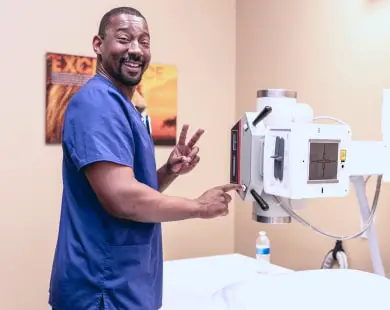
High Demand Career
Employment for all areas of Radiography graduates is expected to grow 5 percent from 2024 to 2034, according to the United States Department of Labor, Bureau of Labor Statistics. Because there are so many potential career opportunities with a radiography degree, the growth rate varies based on your chosen profession.

A Great Life
Learn More
Radiography School Near You!
Las Vegas Location
Address
7398 Smoke Ranch Rd,
Las Vegas, NV 89128
Business Hours
Monday – Thursday: 8:00 A.M. – 10:00 P.M.
Friday – Saturday: 8:00 A.M. – 5:00 P.M.
Sunday: 8:00 A.M. – 2:00 P.M.
Start Your New Career Today!
Northwest Career College is committed to your success!
Request For InformationRadiography Program FAQ
Q. What is a Radiography Program?
The Radiography program at Northwest Career College provides students with the necessary knowledge and skills to pursue their Radiography certification through ARRT (the American Registry of Radiologic Technologists). Students will learn how to use and operate X-ray imaging equipment, as well as how to protect themselves and others from radiation exposure. The program also covers patient care, medical terminology, anatomy and physiology, radiation safety, medical ethics, and legal issues related to radiography.
Q. How long does it take to be a Radiologic Technologist?
Northwest Career College's Radiography Program can be completed in as little as 18 months. After completing the program, students can take a certification exam and apply to become licensed Radiologic Technologists in the State of Nevada. Once licensed, graduates typically apply for Radiologic Technologist, X-Ray Technician, or Radiographer positions.
Q. What qualifications do I need to apply for a Radiography program?
To apply for Northwest Career College's Radiography program, applicants must have a GED (or equivalent) or a high school diploma (or equivalent). They must also pass an entrance exam, submit an Admissions essay, and complete an in-person interview with the Program Chair of the Radiography Department.
Q. Are Radiography programs hard?
All vocational training can be hard, and Radiography programs are no different. Students must thoroughly understand medical terminology, anatomy and physiology, radiation safety, medical ethics, and legal issues related to radiography before becoming licensed Radiologic Technologists. However, with the right preparation and dedication, anyone can become a successful radiographer. Northwest Career College supports its students with up-to-date course materials, experienced faculty, internship opportunities, and other resources to ensure that each student is well-prepared for a career in Radiography.
Q. Is a Radiologic Technologist a doctor?
No. While Radiologic technologists (a.k.a. Radiographers) sometimes work closely with doctors, they are not medical doctors themselves. Radiographers are healthcare professionals who specialize in imaging technology and radiation safety, but they are not qualified to diagnose or treat medical conditions. That being said, Radiographers must be knowledgeable and skilled in the medical field in order to succeed.
Q. How do I become a Radiographic Technologist?
The first step to becoming a Radiographic Technologist is to sign up for the Northwest Career College's Radiography Program. This program is designed to prepare students for a career in Radiology and offers students the opportunity to earn their associate degree, complete clinical rotations at qualified healthcare facilities, and receive specialized training in radiography techniques. After completing the program, you can take a certification exam and apply to become a licensed Radiologic Technologist in the State of Nevada.
Q. What is the difference between Radiology and Radiography?
Radiology is a medical specialty that involves the use of imaging technology to diagnose and treat diseases. Radiographers, on the other hand, are healthcare professionals who specialize in capturing images (such as X-rays) and performing certain invasive procedures for diagnostic purposes. Unlike radiologists, radiographers do not interpret the images or prescribe treatment plans.
Q. What is the salary of a Radiographer?
The average salary of a Radiographer in the United States is approximately $61,370 per year. Salaries are typically higher in larger cities and can vary depending on qualifications and experience.
Q. What are the disadvantages of being a Radiographer?
Some of the disadvantages of being a Radiographer include long work hours, working night shifts, and dealing with difficult patients. Radiographers must also stay current on changing technology and new procedures to remain competitive in their field. However, there are many advantages to being a Radiologist, such as job satisfaction and the potential for high earnings. Additionally, Radiographers have a great deal of flexibility in terms of where they can work and the types of procedures they can perform.
Q. Is Radiography a stressful job?
It can be, depending on the type of work that is being done. Radiographers must remain up to date on changing technology, and it can be difficult to keep up when things are constantly evolving. Additionally, Radiographers often deal with difficult patients and may find themselves dealing with stressful situations. Ultimately, how much stress someone experiences in their job as a Radiographer depends on the individual role and the particular environment.
Q. Does Radiology have a future?
Yes. Radiologists are an important part of the healthcare system, as they use their knowledge to diagnose illnesses, injuries, and diseases. Additionally, new types of imaging techniques are being developed all the time, giving Radiologists even greater opportunities to help their patients. As technology continues to advance, Radiologists will be able to provide even better services for their patients, and Radiologic Technologists will continue to partner with them in collecting images and serving patients.
Q. Do Radiographers make good money?
Absolutely! The median salary of a Radiographer in the United States is over $60,000 annually. Radiographers who specialize in specific fields can earn even more. Additionally, there are many opportunities for career advancement and higher salaries within the field of Radiology. Therefore, a career as a radiographer can be both financially rewarding and personally fulfilling.
Reviewed by: David Bolshazy, M.Ed., R.T.(R)(ARRT) — Radiography Program Chair, Last reviewed: January 2026
- © 2026 NorthwestCareerCollege.edu
- Licensed by the State of Nevada Commission
- Privacy Policy
- Website & SEO Services by Axilweb


